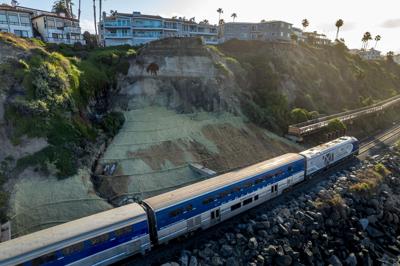The Orange County Transportation Authority Board of Directors on Monday, March 25, approved staff’s recommendation to continue engaging with the office of State Sen. Catherine Blakespear over the language of Senate Bill 1098.
Known as the Southern California Rail Revitalization Act, the bill seeks to improve the Los Angeles-San Diego-San Luis Obispo Rail Corridor through better management and support strategies. Blakespear, who represents north San Diego County and southeastern Orange County in the 38th District, introduced the legislation on Feb. 13.
At a prior meeting of OCTA’s Legislative and Communications Committee on Thursday, March 21, Government Relations Representative Alexis Leicht told the committee the bill had been amended the night before. Staff also confirmed the bill had been changed to reflect conversations among Blakespear, OCTA Director and Fifth District Supervisor Katrina Foley, and OCTA CEO Darrell Johnson.
Lance Larson, Executive Director of Government Relations, said all aspects of the legislation discussed had been modified to some extent, with some portions receiving more changes than others.
“My sense is (the bill) is much, much better, and the areas that we still maybe have a few concerns about, we can continue to talk about,” said Larson. “But I think she touched all the things we raised to her.”
In a press release, Blakespear’s office said the bill was informed by the senator’s work chairing the Senate Transportation Committee on LOSSAN Corridor Resiliency, which heard a report in December 2023 from the Senate Office of Research about the challenges the corridor faces.
Blakespear also commented on the “unacceptable” nature of passenger rail service through San Clemente being shut down at the time following a Jan. 24 landslide.
“Interruptions to service have become commonplace in recent years, and that has hurt ridership,” she said. “It is time to get ahead of the curve, plan for the future and turn the rail corridor into the highly efficient and reliable mover of goods and people it was designed to be.”
SB 1098 requires new reporting requirements for the California Transportation Secretary and others, according to Leicht, who described four main components of the bill.
The first portion would require the Transportation Secretary, the California Transportation Commission, the Secretary of the state’s Environmental Protection Agency and the Secretary of the California Natural Resources Agency to submit a report to the state legislature by Jan 1, 2026.
The action would be an effort to align state and local planning, provide prioritization of capital and resiliency improvement projects on the LOSSAN Corridor, and offer a description of administrative actions that the California State Transportation Agency has taken regarding the corridor’s operations and performance.
Next, a working group that has not yet been assigned a supervisor by Blakespear’s office would also need to submit a report by Jan 1, 2026. The report would include recommendations related to long-term viability and comprehensive coordination of passenger and freight rail services.
Leicht added that other items would detail what kind of funding is available for intercity and regional rail services, strategies to increase rail services and limit disruptions, alternative management and operations models or structures, changes to statutes or rules, and opportunities for rail to support equity, safety, and zero-emissions initiatives.
The working group would comprise representatives from LOSSAN Corridor track owners, passenger and freight rail operators, county transportation commissions, metropolitan planning organizations for the corridor’s six counties and community stakeholders. The governing bodies of the LOSSAN Rail Corridor Agency, Metrolink, and the North County Transit District, would have to approve the report before sending it on, according to Leicht.
The bill’s third component would require the Transportation Secretary to coordinate with corridor operators to submit a report, starting Jan 1, 2027, and every two years thereafter, discussing the corridor’s performance. Lastly, the Transportation Secretary would also have to provide guidance and recommendations to create a more significant role in the coordination of stakeholders in the LOSSAN corridor area.
Before the Legislative and Communications Committee moved to direct staff to continue working on the bill, staff added that they believe OCTA is making positive, forward momentum but don’t have enough confidence yet to take a position on the bill.
SB 1098 is scheduled to be heard by the Senate Transportation Committee on April 9.


